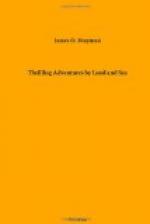They set to work immediately with their axes to fell the tree. It began to totter, when a dark object, they could not tell what, in the dim twilight, crawled from its place of concealment to the extremity of a branch, and from thence sprung into the next tree. Snatching up their rifles, they both fired together; when, to their astonishment, instead of a bear, a young Indian squaw, with a wild yell, fell to the ground. They ran to the spot where she lay motionless, and carried her to the borders of the wood, where they had that morning dismounted. Richard lifted her on his horse, and springing himself into the saddle, carried the almost lifeless body before him. The poor creature never spoke. Several times they stopped, thinking she was dead: her pulse only told the spirit had not flown from its earthly tenement. When they reached the river which had been crossed by them before, they washed the wounds, and sprinkled water on her face. This appeared to revive her; and when Richard again lifted her in his arms to place her on his horse, he fancied he heard her mutter, in Iroquois, one word,—“revenged!” It was a strange sight, those two powerful men tending so carefully the being they had a few hours before sought to slay, and endeavoring to stanch the blood that flowed from wounds which they had made! Yet so it was. It would have appeared to them a sin to leave the Indian woman to die; yet they felt no remorse at having inflicted the wound, and doubtless would have been better pleased had it been mortal; but they would not have murdered a wounded enemy, even an Indian warrior, still less a squaw. The party continued their journey until midnight, when they stopped, to rest their jaded horses. Having wrapped the squaw in their bear-skins, they lay down themselves, with no covering save the clothes they wore. They were in no want of provisions, as, not knowing when they might return, they had taken




